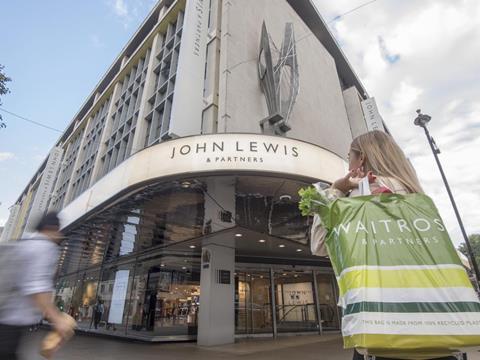
Top story
The John Lewis Partnership has reported a 23% plunge in underlying pre-tax profits while taking a writedown of over £100m on its John Lewis store estate and cutting its staff bonus to 2%.
The partnership’s profit before bonus, tax, exceptional items and IFRS 16 was down 23.1% to £123m, which was “a weaker performance than hoped for”, driven by significant operating profit decline in John Lewis.
John Lewis operating profits before exceptionals were down £75m to £40m, driven by weaker sales in Home and Electricals, IT investment to enable accelerated development of our customer proposition, and growth in non-management Partner pay well ahead of inflation.
Waitrose operating profits before exceptionals grew by £10m to £213m, though after excluding property profits of £16m, it was down £6m. An improvement in gross margins and a strong operational performance was offset by cost inflation, including investment in non-management partner pay.
In total Waitrose gross sales of £6.76bn were down 0.2% on a like for like basis and 1.1% on a total basis.
John Lewis sales of £4.78bn were down 1.8% on a like for like basis and 2.1% on a total basis.
The group took a £101m exceptional charge related to John Lewis, primarily driven by a £110.3m of branch impairments to the department store business. Waitrose was subject to a £30.6m charge following wider strategic restructuring and redundancies.
However, the group booked a headline exceptional income of £107.4m to a £249m benefit from the closure of its defined benefit pension scheme.
This meant that after including exceptional income, Partnership Bonus and the charge for adopting IFRS 16, our headline profit before tax was up 25% of £29m to £146m.
The group awarded a staff bonus of just 2%, which new chairman Sharon White called “prudent and affordable… it recognises the contribution made by Partners working in the business today without creating risk for our future sustainability”.
She added: “We need to reverse our profit decline and return to growth so that we can invest more in our customers and in our Partners. This will require a transformation in how we operate as a Partnership and could take three to five years to show results. We are stepping into a vital new phase for the Partnership and I have no doubt we will come through it stronger.
“Last month I spoke at Partnership Council about the Strategic Review of the Partnership that we are now launching. The review is being led by the executive team but all Partners - those of us who are active in the democracy and those who are not - will have the chance to contribute and shape our future. Further details will follow.”
The group has committed to investing in Waitrose.com, ahead of its partnership with Ocado ending in September. Sales growth through Waitrose.com was 13% up in 2019/20 and it is recruiting 2,400 new partners and building a new fulfilment centre in Enfield to meet increased demand for Waitrose products online.
“We are confident that our new products and services and focus on outstanding customer service will reinforce the strength of our brands. We are planning for the market to remain volatile, but expect continued cash generation, allowing us to further strengthen our balance sheet and maintain our level of investment,” White stated.
Morning update
Domino’s Pizza Group (DOM) has reported a solid rise in sales for the year ending 29 December.
UK system sales were up 4.8% and Ireland up 4.9%.
A total of 32 stores opened in UK & Ireland, of which 29 were franchised, by 23 different franchisees.
Digital continues to be a driver of growth, with online accounting for 91.1% of UK delivery sales
UK and Ireland underlying EBIT before joint ventures and associates was £100.4m, up 1.1%, representing an 8.3% margin as a percentage of system sales.
However, group underlying profit before tax was £98.8m, a decrease of 1.2% year-on-year as a result of higher interest charges.
Following the decision in October to dispose of its directly operated International businesses, being Norway, Sweden, Switzerland and Iceland, the trading results of these businesses, together with International central costs, have been classified as discontinued operations and excluded from underlying results.
Combined, the group’s discontinued International businesses generated £100.7m system sales (down from £104.1m) and a trading loss of £20.8m.
Overall impairment and restructuring charges of £35.4m were also recorded in discontinued operations.
Including taxation and the loss from the International discontinued operations, profit for year was £2.8m, compared to £43.9m in 2018.
CEO David Wild commented: “Our core UK & Ireland business continues to deliver a solid trading result, with UK like-for-like sales up 3.7%. Our digital capabilities continue to fuel this growth, with online sales up 8.8%. Collection also saw a good performance, up 5.3%, and this remains a significant opportunity for us going forward. I would like to thank my colleagues across all our markets, together with our franchisee partners, for their continued hard work and passion for the Domino’s brand.
“In February we were pleased to announce a disposal of our Norwegian business which is subject to shareholder approval, and we expect this to complete by the end of May. We continue to prioritise transactions for our remaining International businesses, although expect that these may take some time as we ensure that we find the best owners for these businesses.”
Stevia producer PureCircle (PURE) has updated the market in the accounting irregularities it identified towards the end of 2019.
It said the investigation work by KPMG LLP to identify possible accounting irregularities and omissions, and to quantify the necessary adjustments to be made to the accounts is now complete.
The investigations relating to the classification and valuation of certain inventory items identified errors that had not been identified by monitoring controls. In line with the guidance, those issues have had the cumulative effect of reducing inventory by approximately US$23, and consequently increasing cost of goods sold by the same amount, spread across financial years 2018 and 2019, with potentially a relatively modest adjustment to 2017.
Separately, during the course of work of KPMG and PricewaterhouseCoopers, matters of concern were identified in relation to how certain other transactions had been constructed and/or reflected in the group’s accounting records. These matters relate to revenue cut-off, and non-commercial transactions.
The investigations identified apparent override of controls by members of senior management that may have contributed to the historical misstatements of the company’s results going undetected. As a result, adjustments with the effect of reducing sales of approximately US$5.9m and US$2.2m have been made to the 2018 and 2017 financial results respectively.
The company does not expect these amounts to change materially in its audited financial statements for the year ended 30 June 2019, but still subject to any further audit adjustments, and yet to be signed off by the group’s auditors, PricewaterhouseCoopers.
Meanwhile, it announced James Ritchie, chief restructuring officer has left the company “having completed the assignment he was engaged to deliver”.
Origin Enterprises (OGN) has reported a 13.8% plunge in first half revenues in the six months to 31 January.
Group revenues decreased by 13.8% to €604.9m in the period, leading to an operating loss of €2.8 million in the first half of the year.
Underlying profits fell to €11.4m, principally reflecting a 25.6% reduction in business volumes in Ireland and the UK, due to lower autumn and winter crop plantings
Continental Europe and Latin America divisions performing in line with expectations. However, strong working capital performance in Continental Europe was offset by higher working capital in Ireland and the UK as a result of lower sales.
CEO Tom O’Mahony said: “It has been a challenging first six months for the Group. Operating conditions faced by farmers and growers, principally in the UK, due to intense and prolonged rainfall has led to a 40% year-on-year reduction in the level of autumn and winter crop plantings. This significantly exceeds the 25% reduction estimated at the time of our Q1 trading update in November 2019 and has resulted in lower than expected underlying profitability and cash generation in our largest division, Ireland and the UK.
“The adverse weather conditions experienced in Ireland and the UK, together with the challenges associated with an anticipated large increase in spring cropping means that it is likely that Group operating profit and adjusted diluted earnings per share for the full year will now be significantly lower than expected at the time of our Q1 Trading Update. Against these particularly challenging conditions, we will focus on optimising operational performance while pausing M&A activity.”
Total Produce (TOT) delivered a “strong” performance in the year to 31 December 2019 as sales continued to grow.
Total revenue in the year grew 22.4% to €6.2bn, while adjusted EBITDA increased by 52.1% to €202.8m.
The increase was due to the incremental benefit of its acquisition of Dole, the improvement of the fresh vegetable division in Dole, good trading in the International division offset in part by competitive conditions in certain markets in the Eurozone.
On a like-for-like basis, excluding acquisitions, divestments and currency translation, revenues were 2% behind the prior year with a small decrease in volume partially offset by price increases.
Fresh produce markets in 2019 were “particularly competitive” in certain parts of Europe.
The International division performed strongly in the year helped by good pricing and margins in some key categories. But this was offset in part by the poor weather in California in April to June which led to less optimal growing conditions and weaker trading in the strawberry growing operation.
The uncertainty surrounding international trade led to a small reduction of exported goods from the US to India and China due to higher tariffs.
Adjusted profit before tax was up 27.9% to €98.3m, while headline pre-tax profits rose 9.6% to €76.5.
Chairman Carl McCann commented: “We are pleased that the Group has delivered a strong performance in 2019 with a 41.4% increase in adjusted fully diluted earnings per share. This is the first year to include twelve months contribution from Dole Food Company.”
“The group is monitoring Covid-19 and, while it is too early to form a definitive view, any disruption is not expected to be material.
“Trading in early 2020 has been satisfactory and the group is targeting continued growth.”
On the markets this morning, the FTSE 100 has fallen back again 0.6% to 6,777.5pts.
Risers include Devro, up 2.6% to 163.2p, Hilton Food Group (HFG), up 2.3% to 1,054p and Glanbia (GLB), up 1.6% to €11.07.
Fallers include Greencore (GNC), down 2.1% to 213.8p, Compass Group (CPG), down 1.5% to 1,633p and Domino’s Pizza Group, down 1.4% to 300.6p.
Yesterday in the City
The FTSE 100 recovered a further 1.5% yesterday back to 6,815.5pts.
The supermarkets were amongst yesterday’s strong gainers, with Morrisons (MRW) up 4.9% to 425p, Sainsbury’s (SBRY), up 3.1% to 212.7p, Tesco (TSCO) up 2.4% to 240.8p and Ocado (OCDO), up 2.4% to 1,153p.
Devro jumped 8.2% yesterday to 159p after announcing its annual results.
Other risers included Reckitt Benckiser (RB), up 5.4% to 6,100p, Hotel Chocolat (HOTC), up 4.9% to 425p, Imperial Brands (IMB), up 3.8% to 1,643.8p, British American Tobacco (BATS), up 3.4% t5o 3,204p, FeverTree (FEVR), up 3% to 1,310p, Britvic (BVIC), up 2.5% to 904p and Cranswick (CWK), up 2.4% to 3,534p.
Yesterday’s fallers included Glanbia (GLB), down 4% to €10.90, Compass Group (CPG), down 3.3% to 1,657p, Marston’s (MARS), down 2% to 1,657p, B&M European Value Retail (BME), down 1.9% to 330.4p, Premier Foods (PFD), down 1.6% to 31.6p, PZ Cussons (PZC), down 1.3% to 188.4p, SSP Group (SSPG), down 1.2% to 486p and Marks & Spencer (MKS), down 1.2% to 161.9p.







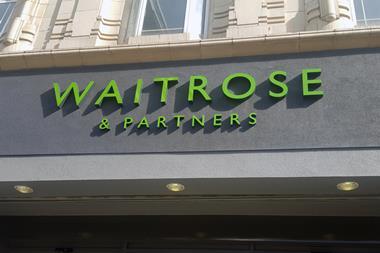
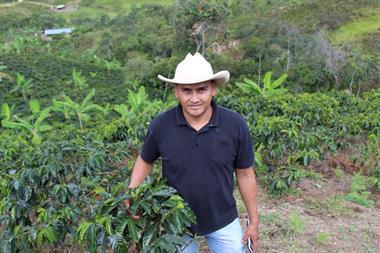
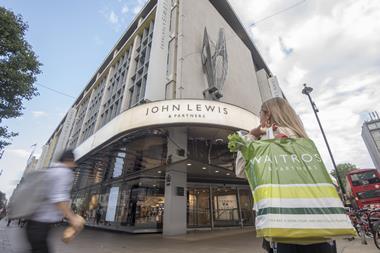

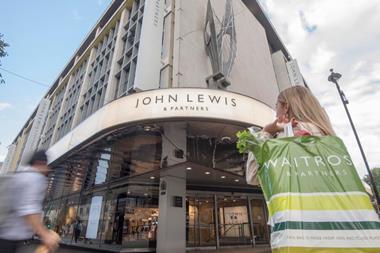







No comments yet